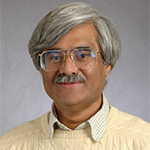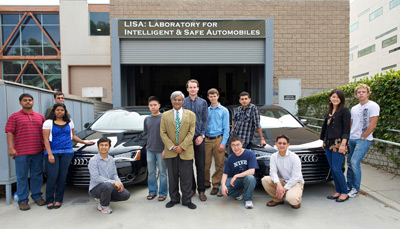Online Magazine for Teens Features UC San Diego Professor and Smart Vehicles
Published Date
By:
- Doug Ramsey
Share This:
Article Content

UC San Diego electrical and computer engineering professor Mohan Trivedi
The online publication of IEEE intended to inspire students ages 14 through 18 to learn more about engineering, technology and computing has placed its current focus on the field of “intelligent vehicles”, and to highlight careers in the field, IEEE Spark put the spotlight on UC San Diego Jacobs School of Engineering electrical and computer engineering distinguished professor Mohan Trivedi. Trivedi is also the past leader of Calit2’s Intelligent Transportation and Telematics research at UC San Diego.
In its August edition, IEEE Spark highlights “Smart Vehicles” and “getting smart about getting around.” In the future, “upgrading your car may involve downloading a software upgrade instead of taking a trip to the dealership,” wrote Robin Hegg in the lead article. “From synching seamlessly with your smartphone to doing the driving itself, smart cars are the future of automobiles and the future starts now.”
In each issue, IEEE Spark introduces high school students to a professional working in the selected field, and in August it highlights the work of Trivedi, “who is driving the future of smart cars.”
The special issue also describes how smart vehicles are revolutionizing transportation, and how to design an efficient vehicle, and also how to enter competitions to design the smart cars of tomorrow. IEEE predicted that by 2040, up to 75 percent of vehicles on the road will be autonomous, and so far, four states and the District of Columbia have passed legislation allowing driverless cars.
UC San Diego’s Trivedi, however, foresees a different future – one where smart cars provide new tools to help drivers navigate more safely and economically, using less gas or other fuels. “Widespread use of autonomous vehicles on global roads must be at least a generation away, and it would be unfortunate to divert resources away from important innovations that will save lives and may serve as a transitional stepping-stone to the autonomous vehicles that may one day be possible,” explained Trivedi in a Q&A with IEEE Spark. “While it makes sense to explore the future of autonomous vehicles, it is also important to consider the role of humans in an autonomous vehicle and come up with a framework where humans and robots work as a team, each aware of the limits, abilities, and intents of one another, to come up with a synergistic solution. We can do so much more to improve safety by focusing on human-assisted smart vehicle systems.”

Laboratory for Intelligent and Safe Automobiles (LISA) at UC San Diego
Trivedi has been one of the leading proponents of an holistic approach to human-centered active safety systems, combining models for the driver, vehicle, and vehicle surround as well as the various activities associated with the complex task of safe driving. “We have published extensively on what we call the ‘looking in, looking out’ (LiLo) framework introduced as far back as 2005… [which] offers a systematic framework to correlate visual context cues from vehicle interior and exterior so that the system can learn and predict driver’s behavior and intentions.”
The research by Trivedi and his students in the Laboratory for Intelligent and Safe Automobiles (LISA) has already influenced R&D and deployments at major automakers. Trivedi points to panoramic vision systems for parking assistance (Lane Keeping Assist in German and Japanese models), Lane and Merge Intent prediction systems for Volkswagen and Audi, and holistic LiLo algorithms and systems for Toyota.
Trivedi serves as a consultant to industry and government agencies in the U.S., Europe, and Asia, including major auto manufacturers. He has published over 500 papers and over a dozen books, edited volumes and video proceedings.
Trivedi recently accepted the Outstanding Research Award from the IEEE Intelligent Transportation Systems Society for the lab’s “pioneering” contributions to the newly-emergent intelligent driver assistance systems.
Asked what advice he would give to recent graduates interested in working in the smart vehicle arena, Trivedi told IEEE Spark’s readers that “it’s important to remember that advances in intelligent vehicles and transportation will not come from just one field. The smart arena fundamentally requires interdisciplinary research and teamwork, and experience in both areas will be essential for recent graduates who want to take their education and use what they learned in industry or academia. Secondly, the opportunities are endless... For research-oriented students there are so many challenging problems to solve and for those interested in applications, there are countless exciting domains to work, from interactive games to assistive technology and medical robotics, from smart cars to smart highways and smart cities.”
Share This:
You May Also Like
Stay in the Know
Keep up with all the latest from UC San Diego. Subscribe to the newsletter today.



